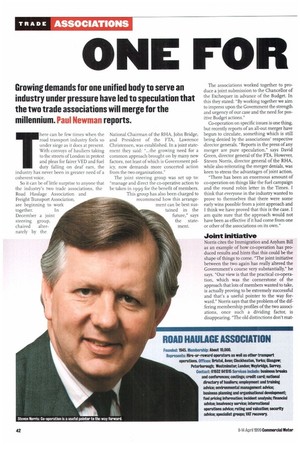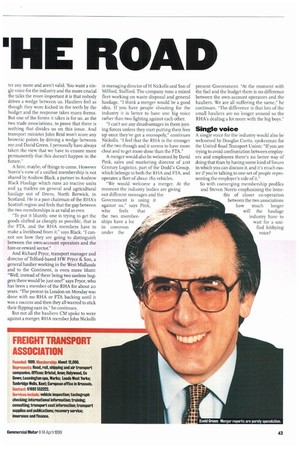ONE FOR 'HE ROAD
Page 44

Page 45

If you've noticed an error in this article please click here to report it so we can fix it.
There can be few times when the road transport industry feels so under siege as it does at present. With convoys of hauliers taking to the streets of London in protest and pleas for fairer VED and fuel duty falling on deaf ears, the industry has never been in greater need of a coherent voice.
So it can be of little surprise to anyone that the industry's two trade associations, the Road Haulage Association and Freight Transport Association, are beginning to work together. I n December a joint steering group,
chaired alternately by the National Chairman of the RHA, John Bridge, and President of the FTA, Lawrence Christensen, was established. In a joint statement they said: "...the growing need for a common approach brought on by many new factors, not least of which is Government policy, now demands more concerted action from the two organisations."
The joint steering group was set up to: "manage and direct the co-operative action to be taken in 1999 for the benefit of members. This group has also been charged to recommend how this arrangement can be best sustained in the future," says the statement. The associations worked together to produce a joint submission to the Chancellor of the Exchequer in advance of the Budget. In this they stated: "By working together we aim to impress upon the Government the strength and urgency of our case and the need for positive Budget actions."
Co-operation on specific issues is one thing, but recently reports of an all-out merger have begun to circulate, something which is still being denied by the associations' respective director generals. "Reports in the press of any merger are pure speculation," says David Green, director general of the FTA. However, Steven Norris, director general of the RHA, while also reiterating the merger denials, was keen to stress the advantages of joint action.
"There has been an enormous amount of co-operation on things like the fuel campaign and the round robin letter in the Times. I think that everyone in the industry wanted to prove to themselves that there were some early wins possible from a joint approach and I think we have proved that this is the case. I am quite sure that the approach would not have been as effective if it had come from one or other of the associations on its own."
Joint initiative
Norris cites the Immigration and Asylum Bill as an example of how co-operation has produced results and hints that this could be the shape of things to come. "The joint initiative between the two again has really altered the Government's course very substantially," he says. "Our view is that the practical co-operation, which was the cornerstone of the approach that lots of members wanted to take, is actually proving to be extremely successful and that's a useful pointer to the way forward." Norris says that the problem of the differing membership profiles of the two associations, once such a dividing factor, is disappearing. "The old distinctions don't mat ter any more and aren't valid. You want a single voice for the industry and the more crucial the talks the more important it is that nobody drives a wedge between us. Hauliers feel as though they were kicked in the teeth by the budget and the response takes many forms. But one of the forms it takes is for us, as the two trade associations, to prove that there is nothing that divides us on this issue. And transport minister John Reid won't score any brownie points by driving a wedge between me and David Green. I personally have always taken the view that we have to ensure more permanently that this doesn't happen in the future."
A hint, maybe, of things to come. However Norris's view of a unified membership is not shared by Andrew Black, a partner in Andrew Black Haulage which runs 20 tractive units and 34 trailers on general and agricultural haulage out of Drem, North Berwick, in Scotland. He is a past chairman of the RHA's Scottish region and feels that the gap between the two memberships is as valid as ever.
"To put it bluntly, one is trying to get the goods shifted as cheaply as possible, that is the FTA, and the RHA members have to make a livelihood from it," says Black "I cannot see how they are going to distinguish between the own-account operators and the hire-or-reward sector."
And Richard Pryce, transport manager and director of Telford-based HW Pryce & Son, a general haulier working in the West Midlands and to the Continent, is even more blunt: "Well, instead of there being two useless buggers there would be just one!" says Pryce, who has been a member of the RHA for about 20 years. "The protest in London on Monday was done with no RHA or FTA backing until it was a success and then they all wanted to stick their flipping oars in," he continues.
But not all the hauliers CM spoke to were against a merger. RH A member John Nickolls
is managing director of H Nickolls and Son of Milford, Stafford. The company runs a mixed fleet working on waste disposal and general haulage. "I think a merger would be a good idea. If you have people shouting for the industry it is better to have one big voice rather than two fighting against each other.
"I can't see any disadvantages in them joining forces unless they start putting their fees up once they've got a monopoly," continues Nickolls. "I feel that the RHA is the stronger of the two though and it seems to have more clout and to get more done than the FTA."
A merger would also be welcomed by David Pink, sales and marketing director of 21st Century Logistics, part of the Dodd's Group, which belongs to both the RHA and FTA, and operates a fleet of about T 8o vehicles.
"We would welcome a merger. At the moment the industry bodies are giving out different messages and the Government is using it against us," says Pink, who feels that the two member ships have a loi in common under the present Government. "At the moment with the fuel and the budget there is no difference between the own-account operators and the hauliers. We are all suffering the same," he continues. "The difference is that lots of the small hauliers are no longer around so the RHA's dealing a lot more with the big boys."
Single voice
A single voice for the industry would also be welcomed by Douglas Curtis, spokesman for the United Road Transport Union: "If you are trying to avoid confrontation between employers and employees there's no better way of doing that than by having some kind of forum in which you can discuss it, and it's much eas
ier if talking to one set of people representing the employer's side of it,"
So with converging membership profiles and Steven Norris emphasising the benefits of closer co-operation between the two associations how much longer will the haulage industry have to wait for a unified lobbying voice?




































































































